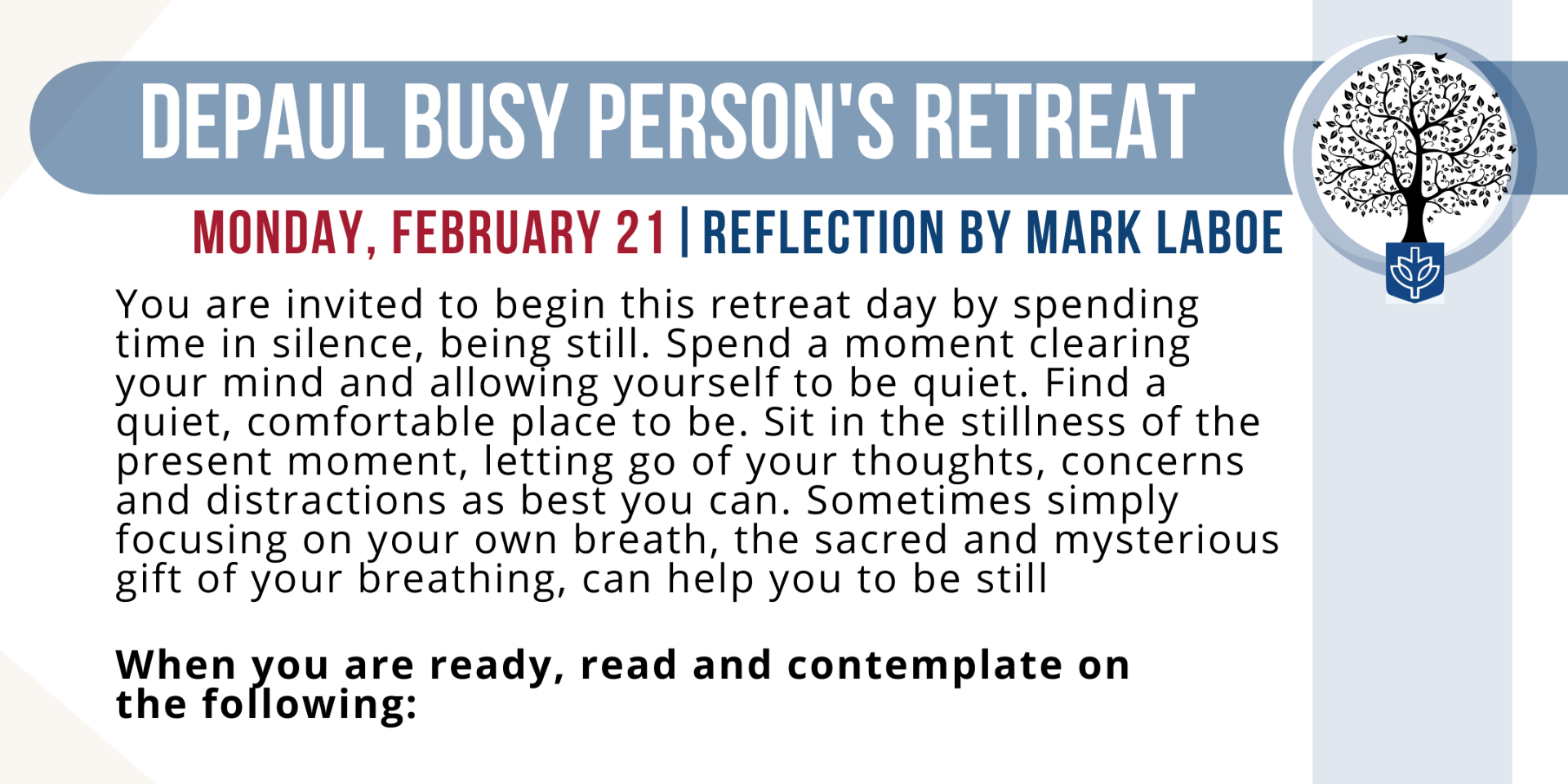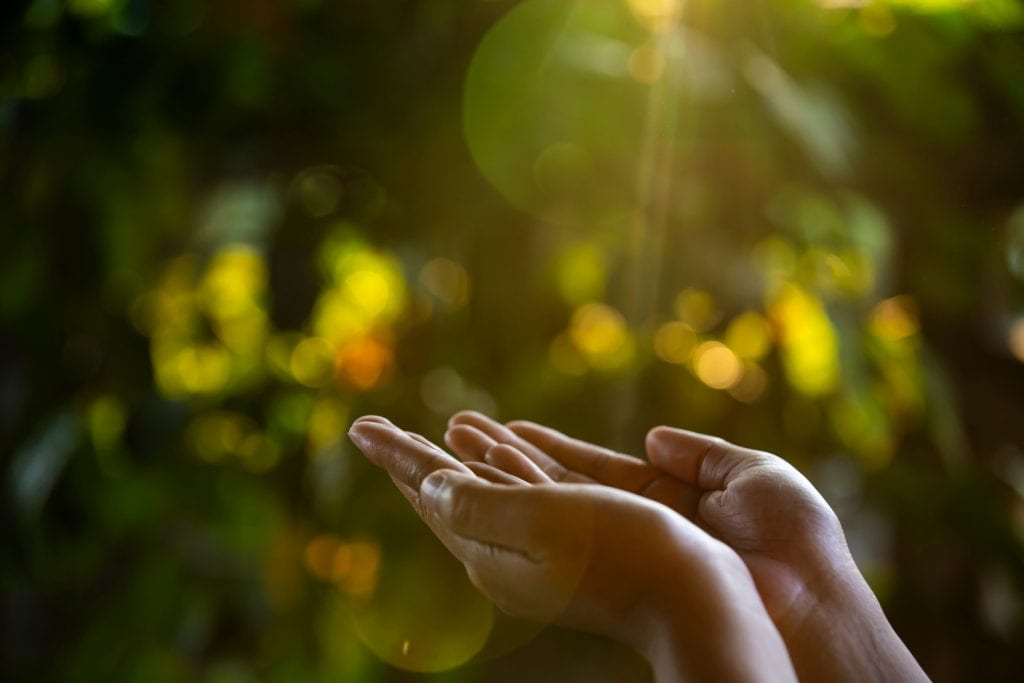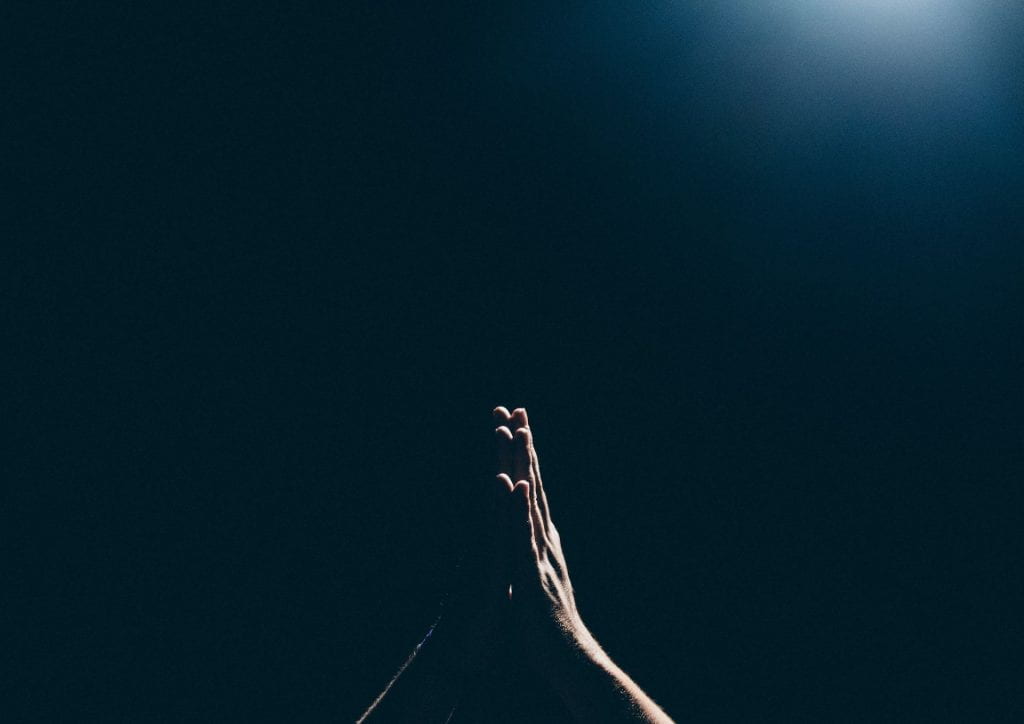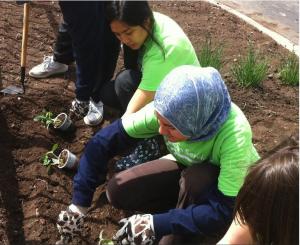

View an illustration PDF version of the reflection here.
What do you think of when you hear the word meditation? I’ll be the first to admit that my thoughts immediately picture a yogi, sitting cross-legged in lotus position, floating a few inches from the ground, blissfully empty of thought, their inner-eye open to the Universe.
Or, perhaps you think of the commercials for meditation apps, promising one minute of calm while a soothing image of a raindrop slowly trickles off a leaf, or a close-up of a parent as they close their eyes on the couch while a chaotic maelstrom of children, pillows, and food swirl around them, their mind the calm center of the storm.
Or, maybe you think of yourself, sitting or standing in prayer, either at home or in a church, mosque, or temple, emptying your buzzing thoughts and nagging worries and trying to offer them up to the Divine for help, relief, and community.
Absolutely none of these are wrong. It seems as long as humans have lived in the world, we have needed a way to take our minds out of the world for reflection, even if for a moment. There is a human need to quiet the mind and not get swept up in life’s constant flow of sensations, thoughts, and noise. Meditation exists in a beautiful kaleidoscope of forms, each adapted to the needs of a particular culture. From Buddhism, Hinduism, and Daoism, to Judaism, Christianity, and Islam, most spiritual traditions have a practice of intentional mindfulness, each with their own permutations, perspectives, and techniques. Even outside of religious practice, meditation has become increasingly popular commercially and in the medical community, as its benefits have been clinically proven time and again (from stress, pain, and anxiety reduction to boosted immunity, mental acuity, and psychological wellness).
While we get our English word meditation through the Latin meditari, meaning to think, ponder or contemplate, it’s also been used as a translation for similar practices in Hinduism and Buddhism (dhyai in Sanskrit, later adapted into a form of the Xiu Dao in Chinese Buddhism). So, what is meditation? Generally, meditation is the intentional, trained act of contemplation to cultivate greater awareness, empathy, calm, or compassion. The second part of this is key, especially from a Vincentian point of view. To Saint Vincent, one of the greatest values of meditation is in how it changes you, not just in understanding but also “affections,” making you more receptive to compassionate action.
Thus, the focus that comes during a meditative state is not the goal; instead, it is a calm, compassionate mindfulness that endures after meditation. As the Saint Vincent quote above notes, it is in “actions and behavior” that “show clearly how they have benefitted from it.” Meditation, seen this way, does not lead one away from the world, to live in seclusion on a mountain-top; instead it leads one back into the world, but with greater empathy and calm.
It’s not just sitting and breathing
There is a wide world of meditative options out there to try. A few broad categories are described below. Most of these practices incorporate awareness of breath in their technique, which is simply focusing on each breath that comes in and out. Close your eyes. Breathe in.. and out. Focusing on breathing helps clear the mental clutter.
MINDFULNESS MEDITATION
Adapted from the Buddhist tradition, mindfulness meditation is the practice of attempting to become a neutral observer of your own thoughts and feelings. After settling into your breathing, if a thought comes, let it visit like a guest, and then let it leave just as freely. The goal is to not become impatient or engaged in any one thought or feeling. Easy to say, hard to do. Mindfulness can often use breath awareness, a repetition of a mantra, or a physical focus like prayer beads or a rosary to help better focus the mind.
MOVEMENT MEDITATION
Rather than trying to sit still and be as unmoving as your thoughts, movement meditation leans into the fact that we are embodied creatures, and engages our physicality so that our minds can become free of noise. This includes yoga and tai chi, but also activities like walking and gardening. If you find the idea of sitting still excruciating, this might be the one for you. The next time you go for a walk or run (weather permitting) try focusing on your breath, and letting your mind empty. Walking through nature can be enormously helpful in attuning your mind not to the past or future, but to the present.
SPIRITUAL MEDITATION
Spiritual meditation really varies by religious tradition, but it can be best thought of generally as a kind of prayer. Spiritual meditation often incorporates the mantras, stories, and reflective practices of a religious tradition. For example, Ignatian meditation is a Christian practice that heavily uses imagination and visualization, rooted in Catholic cosmology, to guide and focus the mind. Alternately, Sufism, Jewish Kabbalah, and other traditions have rich practices that also incorporate movement and mindfulness in their contemplation of God.
PAUSE FOR REFLECTION
I hope that this brief tour through the world of meditation will encourage you to try it, if only for a week. See what happens! Pick a time every day to spend ten minutes in contemplation. Maybe try different forms of meditation to see what works, and what absolutely doesn’t.
Also remember that emptiness of mind is not the goal; it’s the compassionate clarity that follows that matters.
- What form of meditation seems to come most naturally to you? What form doesn’t?
- Is there a spiritual tradition that uses meditation that you’d like to learn more about?
- How can you incorporate meditation into your daily life?












